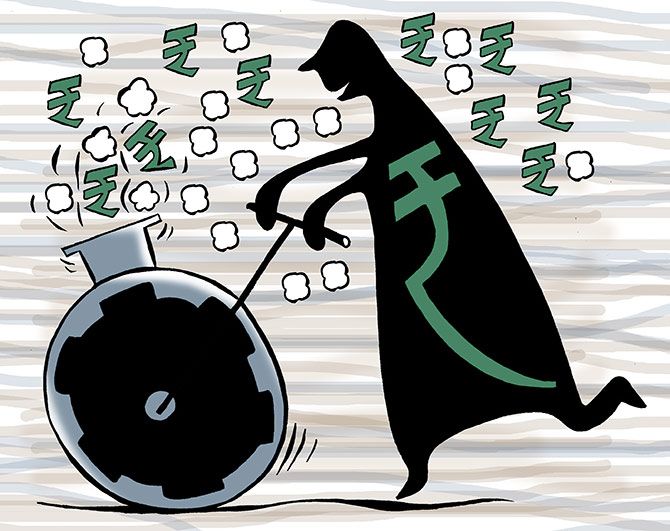To improve compliance, govt may introduce lottery reward for filing GST. The Consumer Welfare Fund, where anti-profiteering proceeds are deposited, will be used to reward the lucky winners on monthly and annual bases.
The prize money, yet to be fixed, may run into several lakhs of rupees for the annual draw, and about Rs 50,000 for monthly draws.
Illustration: Uttam Ghosh/Rediff.com

Taking a copy of the bill from the seller may turn rewarding, with the government planning a lottery scheme for customers to improve compliance.
The measure is being explored by the revenue augmentation officers committee to boost collections and it may be put before the Goods and Services Tax (GST) Council during its meeting on December 18.
The Consumer Welfare Fund, where anti-profiteering proceeds are deposited, will be used to reward the lucky winners on monthly and annual bases.
The prize money, yet to be fixed, may run into several lakhs of rupees for the annual draw, and about Rs 50,000 for monthly draws.
“The idea is to encourage consumers to ask for a bill, which will push sellers to become GST compliant and pay tax.
"A lot of beauty parlours and small hotels, for instance, do not give a bill handout.
"The lottery scheme will have a significant reward amount and this will encourage people to participate,” said a government official.
The lottery scheme will be available for business-to-consumer transactions.
Consumers will require to upload sale receipts on a dedicated portal for where winners will be picked.
The Consumer Welfare Fund was created by the central government to allow companies to deposit the profiteered amount in cases where it cannot be returned to consumers.
According to the anti-profiteering rules under the GST regime, suppliers of goods and services should pass on the commensurate benefit of any reduction in the rate of tax on such supplies or the benefit of input tax credit to the recipient by way of a commensurate reduction in prices.
Recently, Nestlé was ordered by the National Anti-profiteering Authority (NAA) to deposit Rs 90 crore in the fund for not passing on the benefit of rate cuts to end consumers.
The GST Network (GSTN), the National Payments Commission of India (NPCI), and the Central Board of Indirect Taxes and Customs are proposed to be involved in the lottery process.
“Involving more agencies will reduce chances of any fraud in picking winners,” said another official.
The lottery scheme will be on the lines of what the Delhi government had under the value-added tax regime for consumers, said the official.
The Delhi government had introduced the Bill Banao, Inaam Pao scheme in 2015 during the VAT regime.
According to the scheme, a customer was eligible for a prize of five times the taxable value subject to a cap of Rs 50,000, if he/she purchased from a registered dealer.
The minimum taxable value of goods was Rs 100 and included eateries.
Nearly Rs 5.65 lakh reward amount was distributed among the participants.
Because of the scheme, the Delhi government found that 224 dealers manipulated their records.
“Similarly, we aim to crackdown on tax evaders using this (lottery) scheme,” said the official.
M S Mani, partner, Deloitte India, said that it is essential to ensure GST compliance across the value chain, especially at the retail level.
"Hence, any measure to encourage end-consumer level awareness will lead to significant improvements in compliance behaviour at the preceding supply chain levels as well," he said.
The government is brainstorming innovative ways to plug tax leakages and boost revenues.
The revenue has fallen short of compensation requirements of states.
The Centre has asked states to recommend ways to improve compliance and collections.
States are yet to receive compensation dues of four months from August onwards, forcing a few states to plan legal action against the Centre.











 © 2025
© 2025